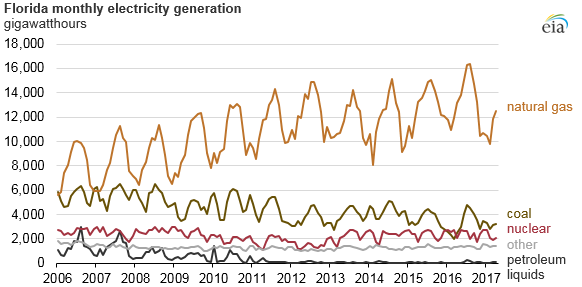Gas pipelines critical to get gas to Florida – state added 3.4 GW of gas-fired power since 2016, another 3.9 GW coming in next 6 years
The retirement of older coal and oil-fired power plants in the state has instigated the need for new natural gas generation capacity and, because Florida lacks the appropriate geology for underground natural gas storage, the gas necessary for feeding the new plants must come from out of state, via pipeline.
The Federal Energy Regulatory Commission (FERC) allowed the Sabal Trail natural gas pipeline to undergo full operation on July 3rd, 2017. The pipeline is 515 miles long, stretching from Tallapoosa County, Alabama, through Georgia to the Central Florida Hub in Osceola County.

The pipeline is connected to the Transco Pipeline, in Alabama, and transports natural gas into Florida for use in electricity generation. Florida itself has added 3.4 giga-watts to its natural gas-fired electricity generation capacity since the beginning of 2016—a larger addition than any other state. Florida also will add another 3.9 giga-watts in the next six years.

Bill Yardley, the president of Sabal Trail Management, LLC and president of U.S. Transmission and Storage for Spectra Energy, noted that the pipeline would “provide a critically-needed source of…natural gas to the Southeast U.S. to meet the growing demand” for natural gas generation.
An EIA report indicated that, in 2015, Florida had the fifth highest demand for natural gas, at 1.34 Tcf of gas—which amounts to approximately 5% of the total U.S. natural gas demand for that year.
Sabal Trail is currently only operating in Phase 1, with a total capacity of 810 Mmcf per day. In 2020, that capacity will be increased to 980 Mmcf per day with the addition of two more compressor stations. In 2021, the pipeline’s capacity is scheduled to be increased further, to 1,050, with expansions on existing compression stations.
To support the new demand that the Sabal Trail pipeline will place on Transco’s Alabama pipeline, the Hillabee Expansion project was initiated with the initial goal of adding 800 Mmcf per day of capacity. Two more phases are planned for the Hillabee Expansion, adding 200 Mmcf per day and 100 Mmcf per day in 2020 and 2021, respectively—which will be in line with the capacity increases to the Sabal Trail pipeline.
Sabal Trail Transmission is a joint venture of Spectra Energy Partners, LP (ticker: SEP)—which recently was acquired by Enbridge Inc. (ticker: ENB)—NextEra Energy Inc. (ticker: NEE), and Duke Energy (ticker: DUK). The pipeline is meant to deliver its natural gas to Florida Power & Light Company, and Duke Energy of Florida.
During its construction, the pipeline is estimated to generate $755 million in construction related revenues, and employ 5,667 people during the course of the construction. For permanent impacts, the company stated that 527 jobs will be created with $22 million in annual wages, with $74 million in total economic output.
In 2015, total consumption of natural gas in the United States was 27.31 trillion cubic feet (Tcf), the EIA reported. Florida came in at No. 5, by amount and share of total U.S. natural gas consumption:







